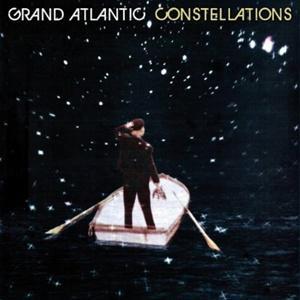 Does environment stimulate inspiration or does inspiration dictate the environment?
Does environment stimulate inspiration or does inspiration dictate the environment?That’s a question that can be asked over and over regarding Brisbane-based Grand Atlantic’s latest album, Constellations. Whereas their last release How We Survive was an immediately addictive slice of psychedelic-dripped power pop—that quickly climbed into my top-10 release list for the year – Constellations is another acid trip altogether. Recorded in 12 days at the certainly-haunted Seacliff Lunatic Asylum near Dunedin, New Zealand, Constellations seems to be a reflection of that psycho-geographical location. Dark, almost infinitely dark, compared to the light urgency of garage pop in How We Survive, Constellations echoes with hidden spaces, chilling touches, and near phantasmagorical breaths. Spectral forms seem to duck in and out of the shadows, dark spaces hiding in the music, while the hint of distant poltergeists lingers.
Sure, I might be making too much of this . . . but maybe not. Lead singer/songwriter Phil Usher claims the band had quite a few “strange experiences” while there, from voices to strange sounds, to moving microphones. The boys even go so far as to thank “the ghost voices of the past/present residents of Seacliff” on the liner notes.
But it’s more than that.
Dale Cotton’s production is definitely of the moment. Thick and claustrophobic, barely any light seems to escape from the spinning CD. None of that is to say that the album is a downer, it’s not. But it’s a different record from How We Survive, for sure. Now, in fairness, having traveled with the boys, I remember clearly Phil and drummer Mat Von Diehm telling me that they wanted something different with their next album after How We Survive. They wanted something darker, more swimmingly psychedelic, less poppy and more adventurous. So perhaps in this case it was the inspiration dictating the environment.
Whatever the case, the results are spectacular.
 Kicking off with the mid-tempo swirling vibe of “Searchlight” it’s clear this isn’t Grand Atlantic’s attempt at a breakthrough pop record. Thick waves of guitar pummel like waves battering the shore. Phil’s voice breaks through in all its rough-hewn glory, as the band breaks it down. Von Diehm keeps it steady until Sean Bower’s bass and Morgan Hahn’s chiming 12-string come racing back in . . . like the wind sweeping through a broken asylum window. The song is haunting, in the truest sense. Dense and thick, even through the moments of stillness. It certainly sets the tone.
Kicking off with the mid-tempo swirling vibe of “Searchlight” it’s clear this isn’t Grand Atlantic’s attempt at a breakthrough pop record. Thick waves of guitar pummel like waves battering the shore. Phil’s voice breaks through in all its rough-hewn glory, as the band breaks it down. Von Diehm keeps it steady until Sean Bower’s bass and Morgan Hahn’s chiming 12-string come racing back in . . . like the wind sweeping through a broken asylum window. The song is haunting, in the truest sense. Dense and thick, even through the moments of stillness. It certainly sets the tone.And that tone is laid down for “Central Station Blues” the first of several terrific rockers on Constellations. Von Diehm adopts an extra set of arms to lay down the beat with Dale Cotton on congas, while Sean quickly grows a bonus set of fingers, which race up and down the bass in percolating time. Phil unleashes a steady garage terror on top of this foundation, with he and Morgs layering guitar and effects on top with maniacal abandon. And there, amidst the walls of guitars and the impenetrable production, is what Grand Atlantic does so well. Garage rock guitar licks sear through the mix with Phil’s trademarked mastery of melody and hooks. Throughout the song, and album, Phil’s voice –best described as a hoarse whisper—is perfectly in tune with the songs. A soaring, infectious cut.
From there the album goes on, dipping and dropping in mood and tone. “Carved from Stone,” is an assault of brick walls of guitar, barely contained within the framework of the CD. “Constellations” is a gorgeous, mid-tempo, semi-acoustic ballad, laced with touches of post-psychedelic Beatles, The Church, and the Brisbane-rock scene, completed with hypnotic guitar work courtesy of Morgs.
One of the things that separates Constellations from How We Survive is the immediacy of the listen. How We Survive sucked me in like a pornstar giving a $2 blow job. Immediate and unforgiving. Once in its grasp, there was no way for me to escape. Constellations is different. A slower lover, it requires time and repeated love-making sessions to really appreciate it’s beauty. Songs like “Mountains Too Steep,” lack the urgent grab of a How We Survive cut like “Used to be the Sensitive Type.” But still . . . it’s all there, it just takes longer to unfold. And in the end, that might make it a more satisfying lover.
None of that is to say that there aren’t killer urgent tracks on Constellations. There are. The already mention “Central Station Blues” is joined by blow-my-mind rockers like “Poison to the Vine,” “Fresh Ideas In Home Security,” and one of my favorites on the album, “No Man’s Land,” with its ghostly, neo-sitar and haunting voices intro.
With its density of craft, Constellations may not be the album that Grand Atlantic needed to make to burst themselves to the top of the scene, but I get the feeling it’s an album that band needed to make for themselves-- to grow and mature. A work of cerebral intensity, Constellations seems to be a record that Grand Atlantic needed to free from their souls, like a snake sheds its skin, freeing themselves from old confines so they could break out into the new.
With that thought, Constellations is a stunning success. A mind-altering trip of neo-psychedelia that never loses sight of its pop roots. I can only imagine that when the band goes back to the studio and fuses what they’ve done with these last two releases, we’ll have a masterpiece for the ages.
And I know they can do it.
--Racer
http://www.grandatlantic.org/

